Badfan v Superman: Top Ten Movie Myths, Part 1
E. Stephen Burnett: Greetings, superfans or would-be superfans.
Kerry Nietz, meet Austin Gunderson. Austin, meet Kerry.
I’ve spoken with you both separately about a conversation regarding Batman v Superman: Dawn of Justice, which we all enjoyed very much. I’m calling this conversation “Badfan v Superman: Top Ten Movie Myths,” which we can turn into SpecFaith articles.
My thought is that we could trade responses in the next few days to ten movie myths I’ve written. Each of us could get one response each, length “reasonable,” e.g. a few paragraphs.
Be warned: today’s and tomorrow’s discussions are heavy with story spoilers.
What do you think about these top ten myths about Batman v Superman: Dawn of Justice?
- BvS is horrible, grimdark, worst superhero story ever.
- BvS only wants to get some of that sweet Marvel moolah.
- BvS ought to be for General Audiences and have mass appeal.
- Superman is dull, not colorful, weak, mopey, unheroic, uninspiring.
- Batman has no reason to hate Superman and his story makes no sense.
- Lois Lane and other supporting heroes make stupid and senseless choices.
- Lex Luthor was ridiculous, over-acted, and had no motivation for his villainy.
- BvS jumps around, is too serious, doesn’t follow Superhero Movie Rules, isn’t predictable(?).
- Personalized attack: Director Zack Snyder sucks, hates Superman, makes pretty images with no weight.
- BvS has a stupid ending: bad resolution to the heroes’ fight, no fulfillment of themes, and doesn’t finish the story.
Myth 1: BvS is horrible, grimdark, worst superhero story ever.
Kerry Nietz
 I think I speak for us all here when I say, that is not the case. Even reviewers like Harry Knowles has changed his tune now. (The Aint It Cool guy, Knowles initially panned the movie, but after a second showing, is now singing its praises.) As a fan who grew up with comics—particularly these two characters—I loved the movie. For a comic reader, the hope from a comic book movie is to see glimpses of the stories you’ve read an enjoyed presented in a such a way that it still feels unpredictable and fresh. I think BvS achieved that goal brilliantly. I can name at least three heavy nods to comic stories I’ve enjoyed in the movie.
I think I speak for us all here when I say, that is not the case. Even reviewers like Harry Knowles has changed his tune now. (The Aint It Cool guy, Knowles initially panned the movie, but after a second showing, is now singing its praises.) As a fan who grew up with comics—particularly these two characters—I loved the movie. For a comic reader, the hope from a comic book movie is to see glimpses of the stories you’ve read an enjoyed presented in a such a way that it still feels unpredictable and fresh. I think BvS achieved that goal brilliantly. I can name at least three heavy nods to comic stories I’ve enjoyed in the movie.
Austin Gunderson
I think anyone who calls this movie “grimdark” probably doesn’t know what the word means. Wikipedia defines it as describing a “tone, style, or setting” that is “markedly dystopian or amoral, or particularly violent or realistic.”
Punisher 2: War Zone was plain-vanilla grimdark. Deadpool is satirical grimdark. But Batman v Superman? The theatrical version certainly isn’t any more violent than your typical Marvel fare—less so, if anything, and with a violence that’s only “realistic” inasmuch as it’s actually consequential. It’s not like there’s any blood and guts flying around, though there probably will be in the forthcoming rated-R version, much to my satisfaction.
“Dystopian”? Not sure how you could get that from this movie. If anything, the setting’s more reflective of contemporary society than that of any other superhero film I’ve seen (I don’t place The Dark Knight Trilogy in the superhero genre). And if contemporary society, seen through this mirror, seems “dystopic” … well, that’s something you might wanna reflect on awhile.
“Amoral”? Only if you think “morality” means doing the right thing because of a genetic predisposition. Only if you think the right thing’s always obvious, and that good intentions never have bad results. Batman v Superman dares to go where few superhero films have ever gone before: into a moral universe so similar to our own that even the good guys sometimes get it wrong. And only when the right choice isn’t blindingly obvious can a film such as this provide a meaningful commentary on the world.
E. Stephen Burnett
Austin has that knack for making me want to see the film all over again. Which my wife and I plan to do, on Saturday. By the way, Austin and I actually got to see the film together for a SpecFaith Mini Moot!
The film is not only not horrible or “worst superhero story ever” but a fascinating exploration of its own overlooked premise:
What if truly good heroes, such as Superman and Batman, existed in a place very much like our world?
And secondly:
What if fantastical places and things such as the planet Krypton, aliens, portals, a lurking tyrant and his slave planet, truly were out there?
This premise is key. You must see it before you try to enjoy these stories and invest in them. As we discuss below, the story is not meant to be as easily accessible “popcorn entertainment.” This may mess with people, perhaps including critics and fans who expect “entertaining fun superhero movies” and “serious and literary-equivalent engagement with themes” to be separate.
Austin is right about the words “dark” or “grimdark,” which are overused. (See also: “reboot,” often paired with “gritty.”) The term “dark” may apply if you are making as your starting point that other shared superhero film universe—and assuming that franchise is only ever “light and fluffy” and assuming the two franchises can only ever Battle to the Death for Box Office Supremacy. But I challenge these assumptions. A different palette does not mean “dark.”
Instead of comparing BvS to other movies, or raising other questions, ask yourself: If these superpowered heroes were real men (and now women, hurrah!), and if they existed in the real world, could the results be something like this? If not—if you are effectively refusing to accept this version of reality as realistic—then we likely disagree on what the real world is like.
There is a time for stories to show a “superpowered” world, already generally decent and happy and bright, around our heroes. Marvel and parts of the DC television universe (“The Flash” and “Supergirl”) do this well. But the DC film universe is taking a different route: “Let’s take these heroes and put them in a real-world equivalent. Let’s challenge them. Let’s attempt to add weight and significance to every disaster, death, and choice. What would happen?”
Answer: True heroes would fight to stay good. But they would struggle. And the dark world—very much like the real world, folks, it’s in the Bible—would make them struggle. As Superman laments, “No one stays good in this world.” But then, thank God, even in the midst of attacks and true suffering, he does.
Myth 2: BvS only wants to get some of that sweet Marvel moolah.
Kerry Nietz
Generally, movie studios set out to make money from movies, yes. That’s how they then make more movies, and pay people. There’s no crime in that.
But if DC was only looking to grab cash, then why make a movie so different then the typical Marvel fare? Why not take the best of the Marvel film catalog and match it beat for beat?
No, I think BvS proves that DC is willing to take risks. And I applaud them for it.
Austin Gunderson
I concur with Kerry. If DC were aping Marvel, the DCEU would seem derivative. Instead, there’s a marked distinction: Marvel films are “fun” (though Captain America: Civil War looks like it wants to be taken more seriously), while DC films are “serious” (though the filmmakers have said Justice League will have a lighter tone than its predecessors).
Yes, Marvel broke the connected-cinematic-universe ground first, but DC appears to have identified what’s missing from Marvel’s vision—namely, a sober examination of both the social implications of superheroes and the physical consequences of their battles—and distinguished itself beautifully.
E. Stephen Burnett
Indeed. Profit motive is not evil, and neither are stories for mass audiences. We’re seeing some (not all) criticism of the movie result from overall displeasure with the superhero movie “takeover.” Marvel got past their filters because it was first, early, and benefited from the Cool Factor of Robert Downey, Jr. But even its goodwill is starting to slip (as Avengers: Age of Ultron negative reviews show—and some of the nitpicks were plain old silly).
But a very decent chap accidentally set up the dichotomy when he asked me whether BvS would suffice to take on Marvel. Instead I had to take on that premise: I said I didn’t care to see these two heroic story-worlds duke it out. I want them to be reluctant partners in super-storytelling. I reject a forced competition.
All three of us understand what DC is trying to do differently, intentionally and to its detriment with some critics and even fans. Both films are challenging both groups—i.e. the critics who insist superhero movies be only one sort of “fun,” and fanboys who find the stories going in different directions. I thought we were supposed to like challenging, unpredictable, original stories … ?
Myth 3: BvS ought to be for General Audiences and have mass appeal.
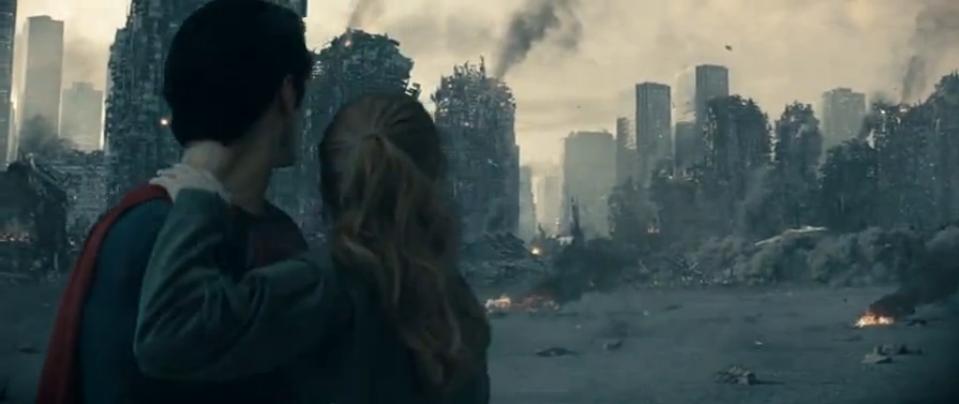
Man of Steel (2013) set the tone and started the themes continued in Batman v Superman: Dawn of Justice.
Kerry Nietz
Clearly it has mass appeal. The worldwide numbers were over 420 million in the first weekend. It simply wasn’t made for all ages. Neither was Star Wars. And in the context of society where Deadpool, an R-rated superhero movie, is being lauded as the “big thing,” a PG13 rating could be considered brave and more accessible.
Austin Gunderson
What Kerry said. Additionally, DC set clear tonal expectations for this film. BvS is a direct continuation of Man of Steel, both in plot and in tone. No one who saw the prior film, or who saw any of the marketing for this one, could’ve possibly been surprised at what they were then served up.
E. Stephen Burnett
Austin mentioned that people who saw Man of Steel should have known what to expect. One critic wrote a highly negative review of BvS and mostly faulted the film for not bringing resolution to its seemingly random religious themes and images. She did not seem to understand the film was middle portion of a continued story that began with Man of Steel. And when I asked, she said she had not even seen Man of Steel. No wonder she felt lost!
Following up on myth number 2, it seems clear DC is playing the long game. They want to appeal to audiences, but also challenge them. They want repeat viewings, pop-philosophy discussions, and “casual” fans transformed into the types of people who will web-search the name of a deleted-scene space critter like “Steppenwolf.” To borrow a now-famous phrase from another story-universe: We’ve just stepped into a bigger world. We just don’t know it yet. But some viewers seem to think “good” superhero movies don’t do that. I find this notion hilarious. We’ve only had super-cinematic universes since 2008! The “rules” are only that new. Who decides what they are? Why not change them?
Myth 4: Superman is dull, not colorful, weak, mopey, unheroic, uninspiring …
Austin Gunderson
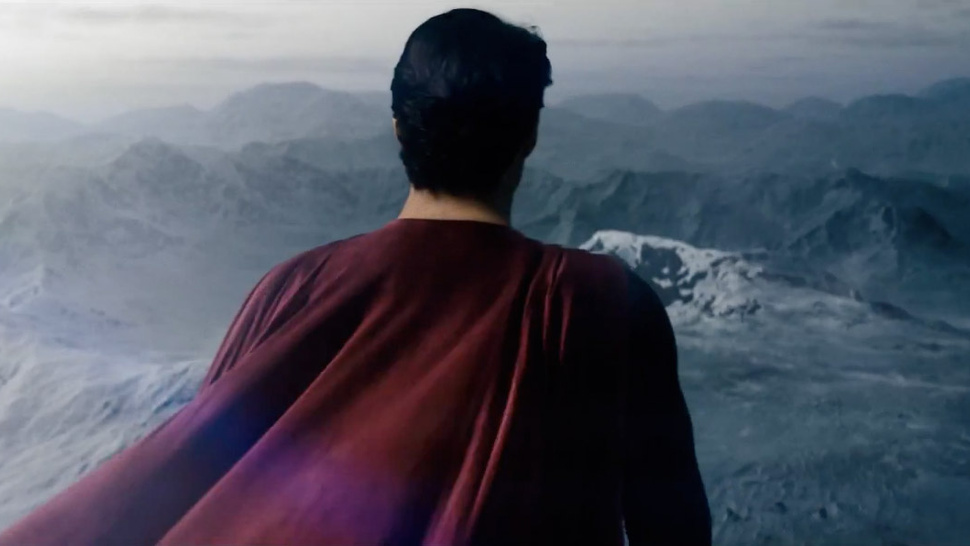 This criticism leapt off the page at me. The idea that Superman is unheroic or uninspiring in BvS strikes me as arising from a vision of heroism totally disconnected from reality.
This criticism leapt off the page at me. The idea that Superman is unheroic or uninspiring in BvS strikes me as arising from a vision of heroism totally disconnected from reality.
By this I don’t intend to insinuate that Snyder’s Supes represents some kind of “realistic” hero who must be weighed down with character flaws for teh dramaz. What I mean is that Superman behaves like someone with a brain. When the common man loses faith in him, and the elites treat him like a liability, he quite understandably reevaluates his place in the world (remember: he’s not from this world!) and the benefits of his continued unilateral action. He sees the civic unrest, the opportunist terrorism, and the unintended consequences, and he thinks hmm, maybe it is me after all, just like all those armchair-quarterback movie critics were saying after Man of Steel.
And so Supes flirts with pacifism (which is the same thing, in effect, as ignoring all the problems and hoping they just go away, though pacifists have a cow whenever this gets pointed out). What brings him back around is his personal relationship with Lois Lane. And once he’s made his decision, once he’s recommitted himself to the cause, he puts the lie to Batman’s assertion that only men are brave. He does this by following Batman into danger that actually imperils his life, and then sacrificing himself in order to save the ones he loves. Ironically, Supes’ self-sacrifice is the only proof that could’ve definitively exonerated him from charges of fascistic unaccountability in the eyes of his critics. Kinda like … Jesus.
There is no greater heroism. And because Supes had to “show his work” in reaching the point where he was willing to make that sacrifice, even for a planet that’d scorned him, the sacrifice actually means something. It’s not an “of course” gesture that we all expect and thus take for granted.
Kerry Nietz
I think Austin makes a great point here, and for anyone who paid close attention in the movie, the filmmakers give a nod to the inherent Easter message. There are crosses in the background of the pivotal scene! (And don’t overlook the weekend it was released!)
I think the movie also touches on a weakness of Superman that makes him especially interesting. Yes, he has near godlike powers, but he isn’t omnipresent. He can’t be all places at all times and so must always make a choice of who to save. That is misery, and I don’t know that a person could stay sane if they were in that position. Imagine the guilt!
E. Stephen Burnett
I join you two in heaving a sigh at these shallow criticisms. As I will argue at Christ and Pop Culture, I believe these notions are partly because Superman has been in pop culture for so long that people “know” just enough about him to be dangerous. Some treat him like little more than a drawing, a character, a Mickey Mouse-like figurehead. Does “he” even act as a person in this version?
Sorry, folks, the “traditional” Superman does not always behave the same way. I’ve done the research. Across decades of storylines he has inner struggles, uncertainties about how to use his gifts, and frighteningly scary villains to fight. Also: he is alien. Superman Returns is underappreciated but flawed partly because it forgot that fact and made Superman too human. But in MoS and BvS Superman is human in that he faces very human choices, familiar choices yet with fantastical causes. That is why he can, and should, be a fascinating character. He is paradoxical: Seemingly all-powerful, and yet his powers lead to so many resulting weaknesses, some almost spiritual.
The movie is asking the question: What if Superman were a real person, and a truly good person, in a world very much like our own and therefore prone to give him mixed-to-scathing reviews? Critics may disagree with that question, but they cannot therefore honestly insist the movie “hates Superman” or casts him as a dark hero. To walk out of the movie claiming, “Superman should have smiled more” or “Superman should have fun saving the world” is like walking out of The Dark Knight annoyed that Bruce didn’t perform the Batusi.
Myth 5: Batman has no reason to hate Superman and his story makes no sense.
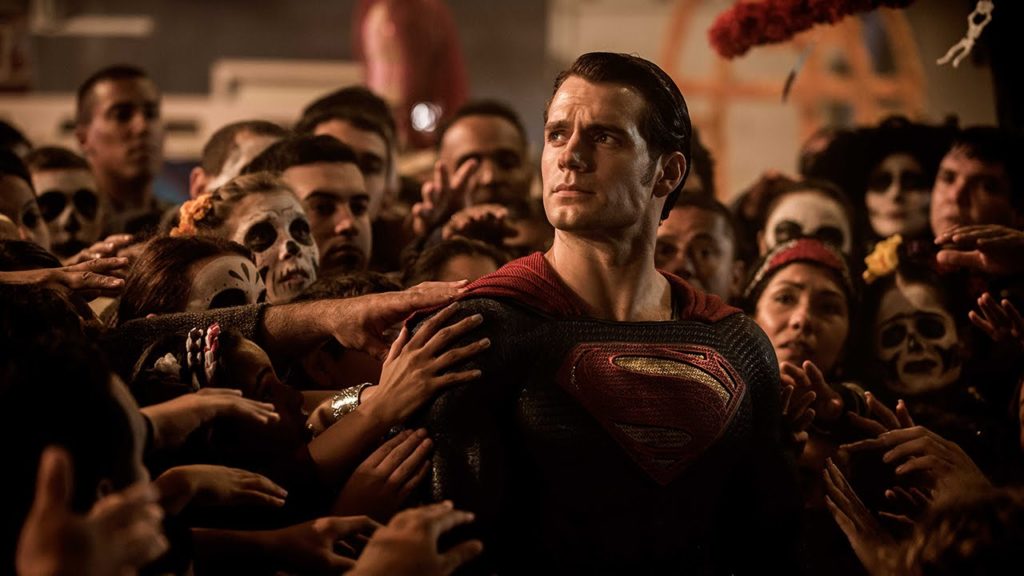
“False god”?
Austin Gunderson
Batman’s suspicion of Superman stems from the same source cited by most of the critics of Man of Steel: the fact that Superman didn’t instantly and magically triumph over General Zod. Of course, Bruce Wayne intellectually concedes that Supes probably meant well and did the best he could, but still, deep down, that’s where the fear takes root.
I find it very sad that many of those who criticized Supes’ supposedly imperfect tactics in MoS, and have now gone on to criticize Batman’s supposedly inadequate cause for enmity with Supes, aren’t sufficiently self-aware to even notice the contradiction.
But it’s much more than mere resentment. Batman’s entire life experience has, as he explains on several occasions throughout the film, lead him to mistrust the assurances of those in power that their own good intentions will keep them honest. He’s seen abuse after abuse, betrayal after betrayal, and now a supernaturally-powerful alien has come to Earth in a whirlwind of apocalyptic carnage and Batman’s expected to just trust his word that he won’t become corrupt?
I see people talking about how, in the movie, Batman’s become unhinged. Frankly, if you close one eye and imagine for just one second that Metropolis and Gotham exist in the real world, Batman would be unhinged not to take action against Supes. An all-powerful individual, without oversight or jurisdictional parameters, assigning to himself the authority to police the world? In the short term, that’s a direct threat to national sovereignty. In the long term, it’s likely to result in a global autocracy. Batman may be a vigilante, but he basically just preps criminals for the cops. Would Superman do no more than that? Would anyone be able to stop him if he decided that wasn’t enough?
Batman knows that he can stop the Superman. Which is the same thing as a moral imperative to at least give it a try.
E. Stephen Burnett
This from Austin:
I find it very sad that many of those who criticized Supes’ supposedly imperfect tactics in MoS, and have now gone on to criticize Batman’s supposedly inadequate cause for enmity with Supes, aren’t sufficiently self-aware to even notice the contradiction.
Yes, this. Tweet it, repeat it.
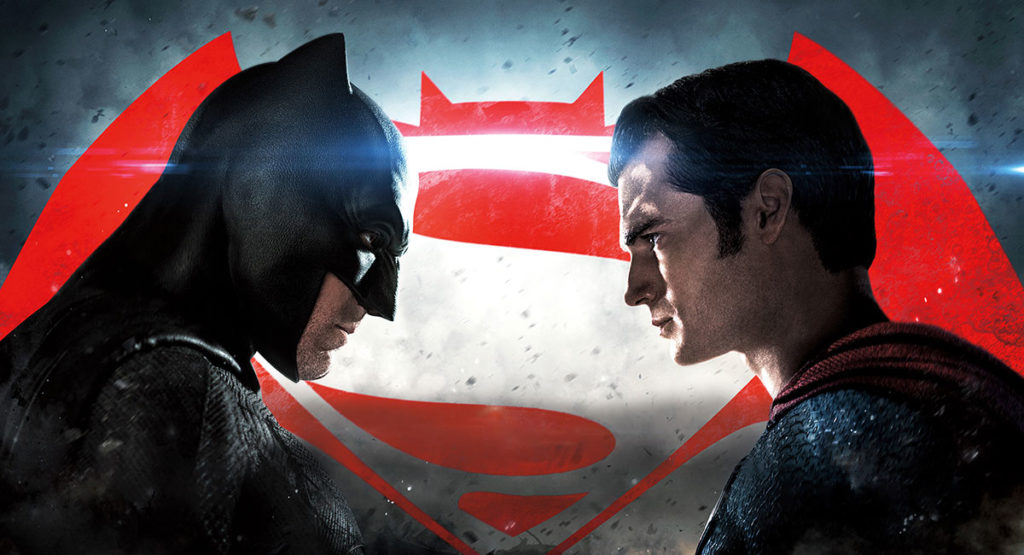 Equally odd is that people who thought Superman near-villainous at the end of Man of Steel seemed uninterested in following up when the sequel story took this accusation seriously and (as was already the storytellers’ plans) began to integrate it into the next story. (Again: This is a continuous, serialized story, in which part 1 truly affects part 2 and beyond.)
Equally odd is that people who thought Superman near-villainous at the end of Man of Steel seemed uninterested in following up when the sequel story took this accusation seriously and (as was already the storytellers’ plans) began to integrate it into the next story. (Again: This is a continuous, serialized story, in which part 1 truly affects part 2 and beyond.)
The film goes “meta” about not only people but themes: People in this world are asking, “Is Superman a good hero?” just as we did after Man of Steel. This does not “subvert” genre tropes. It’s an attempted honest reflection of the real world.
Audiences who lean forward in their chairs will more likely understand Batman and his motives. They will fully understand where he’s coming from, and yet by the end will find themselves (as Bruce does) challenged to think differently about Superman.
Significant spoiler below:
By the end Bruce has concluded, “Men are still good.” His redemption as a hero is underway, and that means, yes, this midpoint story-in-story does find clear resolution. So if someone insists the story is too “dark” or “gritty,” they’re not paying attention!
Kerry Nietz
Yes, I think the fact that Snyder chose to address the “collateral damage” criticism from MoS in BvS took a lot of guts. Artists are typically taught to ignore criticism and follow their own creative impulses—follow your heart!—but here Snyder not only addressed the criticism, he embraced it. Like he said “Yes, you’re right, there was a lot of damage and potential casualties … so what would the fallout of that be?”
(Coincidentally, Marvel is clearly doing this in Captain America: Civil War, as well. This is generally unheard of in comicdom. Death and destruction happen in one issue, and the next issue everything is generally back as it was.)
So, BvS illustrates the fallout, and Batman’s attitude is part of it. Bravo!







































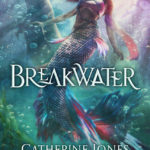


Excellent discussion guys. Like you, I applaud DC for trying something different, rather than just cookie-cutter copying Marvel. I wanted a take on superman that took him seriously. There’s been enough cheese over the decades. I want to see the implications of an alien living on earth. I’m so glad these movies are delivering that.
You guys really need to check out Peater from Christian Geek Central’s review.
Spoiler-free bit
and full spoiler discussion
I’ve also recorded my own humble thoughts at http://www.adamdavidcollings.com/batman-v-superman-dawn-of-justice/ although I think Peater says it better than I could.
Austin and I actually viewed Paeter Frandsen’s video before we went and saw the film. The video really helped to reset my expectations far more positively, because Paeter is a much bigger DCU fan than either of us and also enjoyed Man of Steel.
Oh and this:
“Instead I had to take on that premise: I said I didn’t care to see these two heroic story-worlds duke it out. I want them to be reluctant partners in super-storytelling. I reject a forced competition.”
Yes! Yes! Yes!
It’s like the silly Star Trek vs Star Wars debates. Can’t we enjoy BOTH for different reasons?
Huh…hmm, well I think the biggest issue with 1 probably would be that Zach’s style is often hilariously grimdark, and if the material isn’t up to it, it tends to fail hard. It’s similar to how Tim Burton did Batman, except Tim tends to be a better fit to the source material. Oh, also from what I hear they royally screwed up Batman as a character by making him use guns and brand criminals.
2…eh I don’t think that’s the case either. I do think though that they are much better at animation, and some of it is amazing. I just watched Batman: Assault on Arkham, and was shocked at how great it was, and Justice League: Gods and Monsters was great too.
I think DC’s live action problem is that they try to get great directors (or hot ones) who tend to run rough over the source material. The animated team is often better because they are more respectful even when they take liberties.
3. PG-13 kind of sucks as a rating. It usually just means intense violence but no nudity. I don’t think it helps much. You tend to notice it after a while, where they cheat the rating by having just enough brutal violence then cut away. Sometimes PG is just more organic, sometimes R is better.
4.Supes is a hard character to write period. He’s close to Captain America that way, ad he works better as an idea than a human. I can’t really blame people who fall short of him, although they really need to stop making him into space Jesus.
5. Oh its comics, they don’t need a good reason. We always want to see good guys fight and then team up.
Welcome back, D.M.!
If I have previously read you correctly, you have particularly strong views against G-rated universes a la stereotypical evangelical restrictions. I think for that reason you would appreciate Batman v Superman and I would encourage you to see it. If you saw the film, you might also recognize different story (and battle) contexts that put different spins on statements like, “Batman uses guns.”
I believe Austin has Bat-grappled the label of “grimdark” and shown that it does not apply to this film. Superman and Batman both emerge as champions of true heroism. It does not “darken” them permanently to show how they fight to earn these heroic mantles among the shadows and slanders of a semi-realistic dark world.
Oh I plan on it, just not able to right away.
The PG-13 is weird thing might be explained better by X-Men: Days of Future Past. It actually has some stunning levels of violence, but the PG-13 rating shows how they game it. All the graphic violence is done on cgi characters-sunspot gets his arm chopped off and choked to death, Colossus gets his head crushed and torn apart, iceman’s head removed in ice form. The violence done on human characters is bloodless, like when the teleporter gets stabbed, or happens offscreen, like when Warpath died twice.
That rating, as well as Zac’s particular style might be why It seems so grimdark but really isn’t. Sort of agreeing with that point. It might be like Hellboy where style is strong but subject matter really isn’t bad at all.